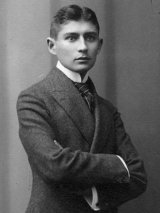Metamorphosis Page #2
The Metamorphosis (German: Die Verwandlung) is a novella written by Franz Kafka which was first published in 1915. One of Kafka's best-known works, The Metamorphosis tells the story of salesman Gregor Samsa who wakes one morning to find himself inexplicably transformed into a huge insect (German ungeheures Ungeziefer, literally "monstrous vermin"), subsequently struggling to adjust to this new condition. The novella has been widely discussed among literary critics, with differing interpretations being offered.
The first thing he wanted to do was to get up in peace without being disturbed, to get dressed, and most of all to have his breakfast. Only then would he consider what to do next, as he was well aware that he would not bring his thoughts to any sensible conclusions by lying in bed. He remembered that he had often felt a slight pain in bed, perhaps caused by lying awkwardly, but that had always turned out to be pure imagination and he wondered how his imaginings would slowly resolve themselves today. He did not have the slightest doubt that the change in his voice was nothing more than the first sign of a serious cold, which was an occupational hazard for travelling salesmen. It was a simple matter to throw off the covers; he only had to blow himself up a little and they fell off by themselves. But it became difficult after that, especially as he was so exceptionally broad. He would have used his arms and his hands to push himself up; but instead of them he only had all those little legs continuously moving in different directions, and which he was moreover unable to control. If he wanted to bend one of them, then that was the first one that would stretch itself out; and if he finally managed to do what he wanted with that leg, all the others seemed to be set free and would move about painfully. "This is something that can't be done in bed", Gregor said to himself, "so don't keep trying to do it". The first thing he wanted to do was get the lower part of his body out of the bed, but he had never seen this lower part, and could not imagine what it looked like; it turned out to be too hard to move; it went so slowly; and finally, almost in a frenzy, when he carelessly shoved himself forwards with all the force he could gather, he chose the wrong direction, hit hard against the lower bedpost, and learned from the burning pain he felt that the lower part of his body might well, at present, be the most sensitive. So then he tried to get the top part of his body out of the bed first, carefully turning his head to the side. This he managed quite easily, and despite its breadth and its weight, the bulk of his body eventually followed slowly in the direction of the head. But when he had at last got his head out of the bed and into the fresh air it occurred to him that if he let himself fall it would be a miracle if his head were not injured, so he became afraid to carry on pushing himself forward the same way. And he could not knock himself out now at any price; better to stay in bed than lose consciousness. It took just as much effort to get back to where he had been earlier, but when he lay there sighing, and was once more watching his legs as they struggled against each other even harder than before, if that was possible, he could think of no way of bringing peace and order to this chaos. He told himself once more that it was not possible for him to stay in bed and that the most sensible thing to do would be to get free of it in whatever way he could at whatever sacrifice. At the same time, though, he did not forget to remind himself that calm consideration was much better than rushing to desperate conclusions. At times like this he would direct his eyes to the window and look out as clearly as he could, but unfortunately, even the other side of the narrow street was enveloped in morning fog and the view had little confidence or cheer to offer him. "Seven o'clock, already", he said to himself when the clock struck again, "seven o'clock, and there's still a fog like this." And he lay there quietly a while longer, breathing lightly as if he perhaps expected the total stillness to bring things back to their real and natural state. But then he said to himself: "Before it strikes quarter past seven I'll definitely have to have got properly out of bed. And by then somebody will have come round from work to ask what's happened to me as well, as they open up at work before seven o'clock." And so he set himself to the task of swinging the entire length of his body out of the bed all at the same time. If he succeeded in falling out of bed in this way and kept his head raised as he did so he could probably avoid injuring it. His back seemed to be quite hard, and probably nothing would happen to it falling onto the carpet. His main concern was for the loud noise he was bound to make, and which even through all the doors would probably raise concern if not alarm. But it was something that had to be risked. When Gregor was already sticking half way out of the bed - the new method was more of a game than an effort, all he had to do was rock back and forth - it occurred to him how simple everything would be if somebody came to help him. Two strong people - he had his father and the maid in mind - would have been more than enough; they would only have to push their arms under the dome of his back, peel him away from the bed, bend down with the load and then be patient and careful as he swang over onto the floor, where, hopefully, the little legs would find a use. Should he really call for help though, even apart from the fact that all the doors were locked? Despite all the difficulty he was in, he could not suppress a smile at this thought. After a while he had already moved so far across that it would have been hard for him to keep his balance if he rocked too hard. The time was now ten past seven and he would have to make a final decision very soon. Then there was a ring at the door of the flat. "That'll be someone from work", he said to himself, and froze very still, although his little legs only became all the more lively as they danced around. For a moment everything remained quiet. "They're not opening the door", Gregor said to himself, caught in some nonsensical hope. But then of course, the maid's firm steps went to the door as ever and opened it. Gregor only needed to hear the visitor's first words of greeting and he knew who it was - the chief clerk himself. Why did Gregor have to be the only one condemned to work for a company where they immediately became highly suspicious at the slightest shortcoming? Were all employees, every one of them, louts, was there not one of them who was faithful and devoted who would go so mad with pangs of conscience that he couldn't get out of bed if he didn't spend at least a couple of hours in the morning on company business? Was it really not enough to let one of the trainees make enquiries - assuming enquiries were even necessary - did the chief clerk have to come himself, and did they have to show the whole, innocent family that this was so suspicious that only the chief clerk could be trusted to have the wisdom to investigate it? And more because these thoughts had made him upset than through any proper decision, he swang himself with all his force out of the bed. There was a loud thump, but it wasn't really a loud noise. His fall was softened a little by the carpet, and Gregor's back was also more elastic than he had thought, which made the sound muffled and not too noticeable. He had not held his head carefully enough, though, and hit it as he fell; annoyed and in pain, he turned it and rubbed it against the carpet.
Translation
Translate and read this book in other languages:
Select another language:
- - Select -
- 简体中文 (Chinese - Simplified)
- 繁體中文 (Chinese - Traditional)
- Español (Spanish)
- Esperanto (Esperanto)
- 日本語 (Japanese)
- Português (Portuguese)
- Deutsch (German)
- العربية (Arabic)
- Français (French)
- Русский (Russian)
- ಕನ್ನಡ (Kannada)
- 한국어 (Korean)
- עברית (Hebrew)
- Gaeilge (Irish)
- Українська (Ukrainian)
- اردو (Urdu)
- Magyar (Hungarian)
- मानक हिन्दी (Hindi)
- Indonesia (Indonesian)
- Italiano (Italian)
- தமிழ் (Tamil)
- Türkçe (Turkish)
- తెలుగు (Telugu)
- ภาษาไทย (Thai)
- Tiếng Việt (Vietnamese)
- Čeština (Czech)
- Polski (Polish)
- Bahasa Indonesia (Indonesian)
- Românește (Romanian)
- Nederlands (Dutch)
- Ελληνικά (Greek)
- Latinum (Latin)
- Svenska (Swedish)
- Dansk (Danish)
- Suomi (Finnish)
- فارسی (Persian)
- ייִדיש (Yiddish)
- հայերեն (Armenian)
- Norsk (Norwegian)
- English (English)
Citation
Use the citation below to add this book to your bibliography:
Style:MLAChicagoAPA
"Metamorphosis Books." Literature.com. STANDS4 LLC, 2025. Web. 4 Feb. 2025. <https://www.literature.com/book/metamorphosis_20>.








Discuss this Metamorphosis book with the community:
Report Comment
We're doing our best to make sure our content is useful, accurate and safe.
If by any chance you spot an inappropriate comment while navigating through our website please use this form to let us know, and we'll take care of it shortly.
Attachment
You need to be logged in to favorite.
Log In